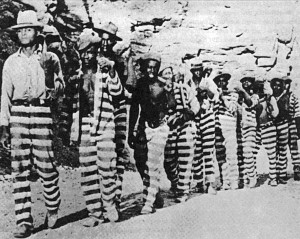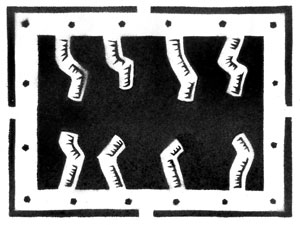Mississippi’s Very Terrible, Horrible Criminal Legal History
There are a couple of reasons why I have resisted commenting on the case of the Scott Sisters in Mississippi. The first is that there has been terrific coverage of the case at Solitary Watch. The second is that this case is unfortunately not atypical. In fact, the truth is that the criminal IN-justice system destroys countless lives every single day in every state of this Union.
So instead of addressing the Scott Sisters’ case, I thought that folks might be interested in getting a better sense of just how awful Mississippi’s criminal legal system has historically been.
The end of slavery disrupted the South’s main labor supply. Mississippi was ground zero of white supremacy after the Civil War. This was in part because blacks greatly outnumbered whites in the state. This engendered a fear of a newly empowered “free” black majority that could claim social, political and perhaps one day economic power. Something had to be done to prevent the rise of the “free” black man.
Mississippi is the state that gave the country the “Black Codes” after emancipation. As David Oshinsky (1996) writes: “The Mississippi Black Codes were copied, sometimes word for word, by legislators in South Carolina, Georgia, Florida, Alabama, Louisiana & Texas” (p.21).
W.E.B. Dubois described the Black Codes as follows: “The original codes favored by the Southern legislatures were an astonishing affront to emancipation and dealt with vagrancy, apprenticeships, labor contracts, migration, civil and legal rights. In all cases, there was plain and indisputable attempt on the part of the Southern states to make Negroes slaves in everything but name.”
Vagrancy laws were the centerpiece of the black codes.
Mississippi provided: “That all freedmen, free Negroes, and mulattoes in this state over the age of eighteen years, found on the second Monday in January, 1866, or thereafter, with no lawful employment or business, or found unlawfully assembling themselves together, either in the day or night time, and all white persons so assembling with freedmen, free Negroes or mulattoes, or usually associating with freedmen, free Negroes or mulattoes on terms of equality, or living in adultery or fornication with a freedwoman, free Negro or mulatto, shall be deemed vagrants, and on conviction thereof shall be fined in the sum of not exceeding, in the case of a freedman, free Negro or mulatto, fifty dollars, and a white man two hundred dollars and imprisoned, at the discretion of the court, the free Negro not exceeding ten days, and the white men not exceeding six months.
According to Oshinsky (1996): “These codes were vigorously enforced. Hundreds of blacks were arrested and auctioned off to local planters. Others were made to scrub horses, sweep sidewalks, and haul away trash” (p.21).
Prior to the Civil War and well after Emancipation, Mississippi had a reputation as a lawless, “rough justice” state. Duels among white men were common until the late 19th century and the courts had no hold over the population. Mississippi was the epitome of vigilante justice. The convict lease system in Mississippi was brutal and deadly. Oshinsky (1996) quotes the state’s former attorney general Frank Johnston as saying that convict leasing in Mississippi had produced an “epidemic death rate without the epidemic (p.50).”

It was against this backdrop that Parchman Farm was established in 1901. Below is a description of the Farm:
“Parchman’s twenty thousand acres covered forty-six square miles. Just inside the main gate was Front camp, which contained a crude infirmary, a post office, and an administration building where new convicts were processed and issued their prison garb. The men got ‘ring-arounds,’ shirts and pants with horizontal black and white stripes; the women wore ‘up-and-downs,” baggy dresses with vertical stripes…The plantation was divided into fifteen field camps, each surrounded by barbed wire and positioned at least a half-mile apart. The camps were segregated only by race and sex. First offenders were caged with incorrigibles, and adults with juveniles, some as young as twelve and thirteen. ‘Feeble-minded’ convicts were everywhere. Parchman housed prisoners like John Brady, an ax-murder with the mental age of a five-year old, because Mississippi did not recognize “idiocy” and “imbecility” as special categories in its criminal code. The result was a brutal, predatory culture made worse by the prison’s vast and isolated expanse (Oshinsky, pp.137-138).”
The Farm is memorialized in the great blues song Parchman Farm Blues written by Bukka White while he was incarcerated there. This is Bukka White's performance of his most famous song:
Here are the lyrics to the song:
Judge give me life this mornin’, down on old Parchman’s Farm.
Judge give me life this mornin’, down on old Parchman’s Farm.
I wouldn’t hate it so bad, but I miss my wife and my home.Now, good-bye wife, all you have done gone, all you have done gone.
Well, good-bye wife, all you have done gone.
But I hope someday you will hear my lonesome song.INSTRUMENTAL
Now, listen you men: I don’t mean no harm, I don’t mean no harm.
Now, listen. You men. I don’t mean no harm.
If you wanna do good you better stay off old Parchman’s Farm.You go to work in the mornin’, just the dawn of day,
just the dawn of day.
Go to work in the mornin’, just at the dawn of day.
And at the settin’ of the sun that is when your work is done.INSTRUMENTAL
I’m down on old Parchman’s Farm, but I sure wanna go back home, Wanna go back home.
I’m down on old Parchman’s Farm, but I sure wanna go back home.
And I hope some day that I will overcome.Judge give me life this mornin’, down on old Parchman’s Farm.
Judge give me life this mornin’, down on old Parchman’s Farm.
I wouldn’t hate it so bad, but I miss my wife and my home.
It is worth remembering as we decry the current state of affairs in Mississippi that this state (like many others in the U.S.) has a long history of INJUSTICE. The Scott Sisters’ case has to be placed within the context of years of racialized surveillance in a state that has criminalized black people for generations.
Other Links to this Post
-
The Scott sisters’ ‘debt to society’ and the new Jim Crow | San Francisco Bay View — January 10, 2011 @ 4:22 pm
-
The Scott sisters’ ‘debt to society’ and the new Jim Crow | All of California — January 11, 2011 @ 2:48 pm

